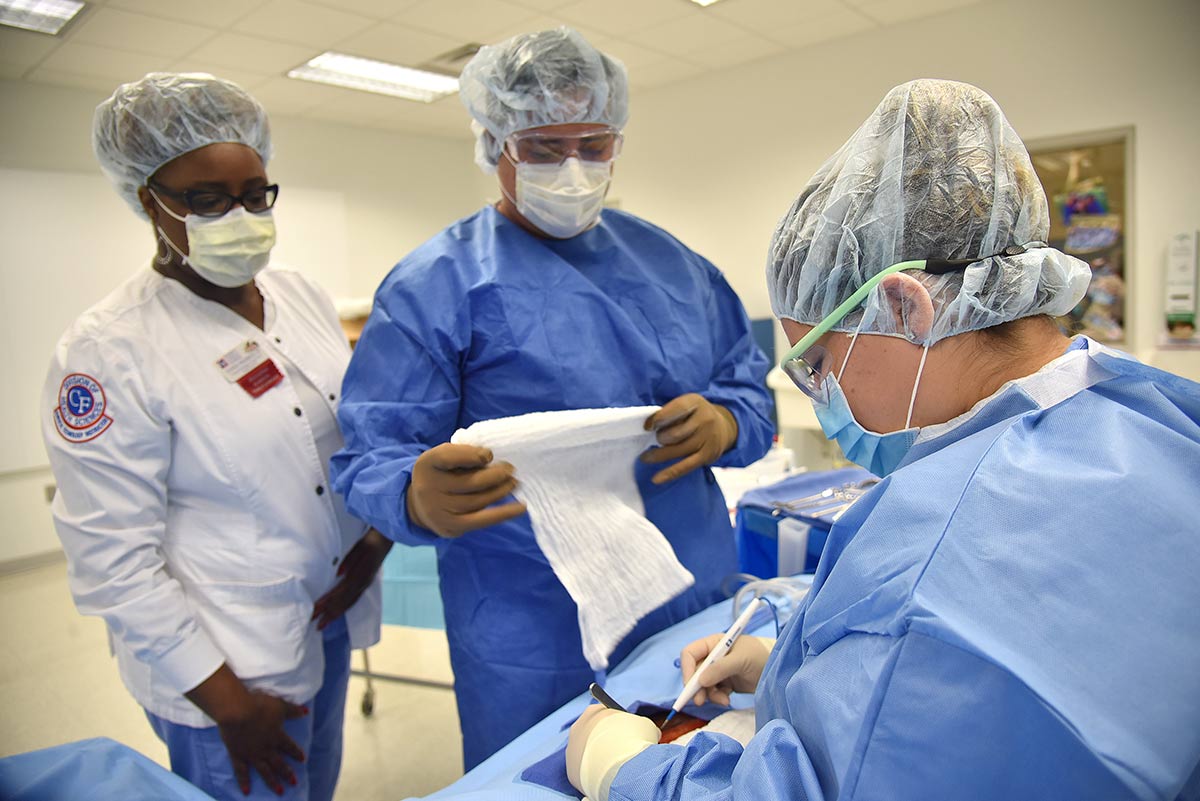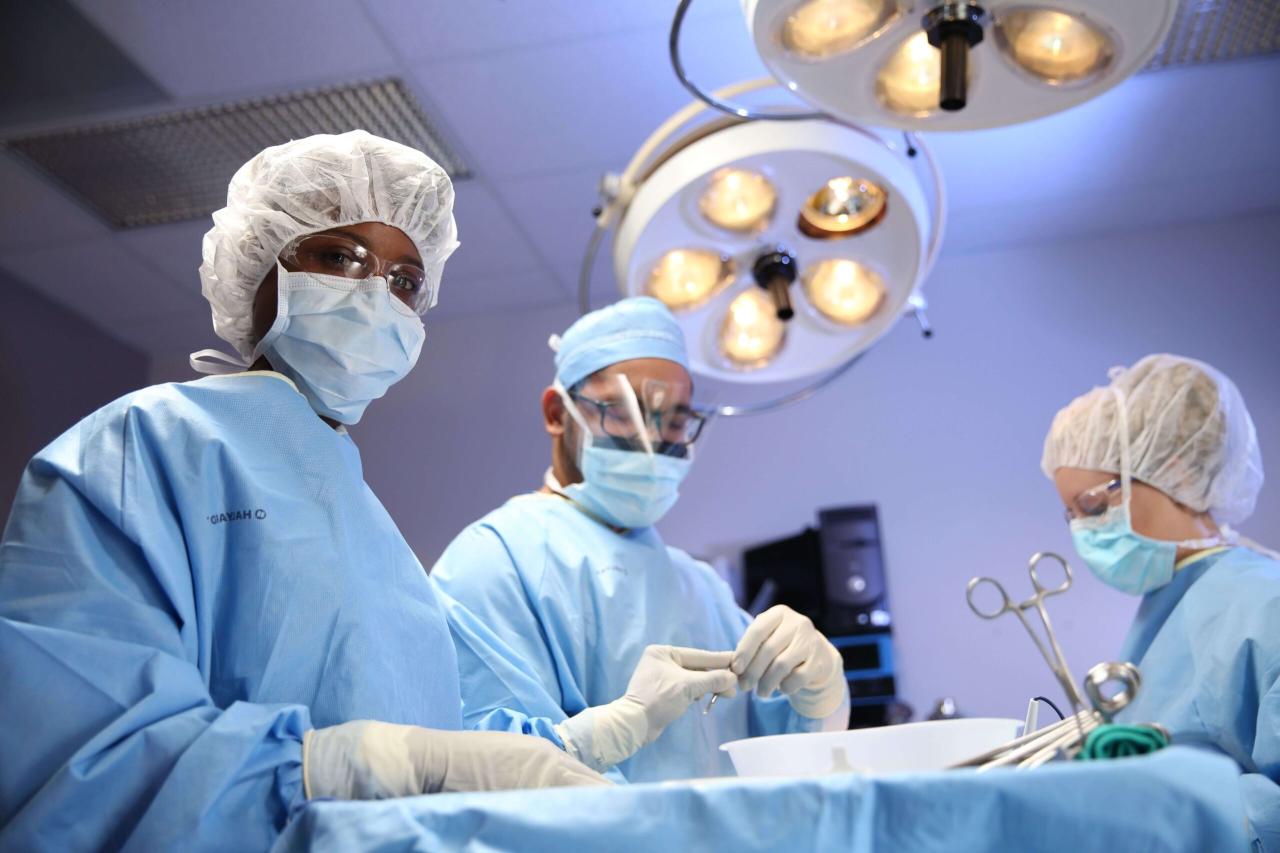Surgical tech programs near me? Finding the right program can be a game-changer for your career. Whether you’re a recent high school grad, a career changer, or simply looking to upskill, this guide helps navigate the options. We’ll explore different program types, accreditation, career prospects, and financial aid to help you find the perfect fit. This journey into surgical technology starts with understanding your goals and finding the resources to achieve them.
This guide breaks down everything you need to know about locating, evaluating, and enrolling in surgical technology programs in your area. We’ll cover curriculum details, job market insights, and the steps to secure funding, making your path to becoming a surgical technologist clearer and more manageable.
Thinking about surgical tech programs near me? It’s a demanding but rewarding field! You’ll need to stay up-to-date on current health issues, like the rise of HMPV in China; check out this article for more info: Viral disease HMPV is on the rise among kids in China — what is it? Understanding global health trends is important, even for surgical techs.
So, start researching those surgical tech programs – your future patients will thank you!
Understanding Surgical Tech Programs Near Me
Searching for “surgical tech programs near me” reveals a diverse range of needs and expectations. Individuals initiate this search for various reasons, including career transitions, educational advancement, or simply the need for geographically convenient training options. The searchers themselves represent a broad spectrum, from recent high school graduates to working professionals seeking a career change or upskilling.
Motivations Behind the Search
Several factors drive the search for local surgical technology programs. Career changers might seek a fulfilling and stable career in healthcare. Others might pursue further education to enhance their existing skills or advance within their current healthcare roles. Geographic limitations often play a significant role, as many prefer programs within commuting distance or their preferred region.
User Profiles, Surgical tech programs near me
- Recent high school graduates exploring healthcare career options.
- Working professionals in related fields (e.g., medical assistants) looking for career advancement.
- Individuals seeking a career change into a medically-focused role.
- Military personnel transitioning to civilian life and seeking healthcare employment.
User Expectations
Users searching for “surgical tech programs near me” expect comprehensive information to guide their decision-making. They likely seek details on program accreditation, curriculum, costs, job prospects, and admission requirements. Easy access to program contact information and application processes is also crucial.
Locating Relevant Programs
Several resources help locate surgical technology programs. Online directories, professional organizations, and educational institutions’ websites are valuable tools. Below is a sample table (note: actual program data will vary by location and time; this is illustrative).
Website and Resource List

| Name | Location | Accreditation | Website Link |
|---|---|---|---|
| Example Program A | Anytown, USA | Accrediting Bureau of Health Education Schools (ABHES) | www.exampleprograma.edu |
| Example Program B | Springfield, IL | Commission on Accreditation of Allied Health Education Programs (CAAHEP) | www.exampleprogramb.edu |
| Example Program C | Online | CAAHEP | www.exampleprogramc.edu |
Program Types
- Associate’s Degree: A two-year program offering a comprehensive education in surgical technology.
- Certificate Programs: Shorter programs focusing on specific surgical technology skills; may require a prior healthcare background.
- Online Options: Programs offering flexibility through online coursework, but may require on-site clinical rotations.
Finding Suitable Programs: A Flowchart
A flowchart would visually represent the decision-making process: Start with location input; branch to program type selection (associate’s, certificate, online); filter results based on chosen criteria; review program details; apply to selected program(s).
Program Curriculum and Requirements
Surgical technology programs vary in curriculum and admission requirements depending on whether they offer an associate’s degree or a certificate. Associate’s degree programs are more comprehensive, while certificate programs focus on specific skills. Admission requirements often include a minimum GPA, prerequisite courses, and possibly an entrance exam.
Curriculum Comparison
Associate’s degree programs typically include a broader range of coursework covering anatomy, physiology, microbiology, medical terminology, surgical procedures, and sterile techniques. Certificate programs tend to be more focused on hands-on skills training, often building upon prior healthcare experience. Both typically include clinical rotations in surgical settings.
Admission Requirements
- High school diploma or GED
- Minimum GPA (often 2.5 or higher)
- Prerequisite courses (e.g., biology, anatomy and physiology)
- Background check and drug screening
- Possible entrance exam (e.g., TEAS)
Program Length
Associate’s degree programs usually take two years to complete, while certificate programs can range from several months to a year, depending on the program’s intensity and focus.
Career Outlook and Job Market

The job market for surgical technologists varies geographically, influenced by factors such as population density, healthcare infrastructure, and the presence of hospitals and surgical centers. Larger metropolitan areas generally offer more opportunities, but salaries and cost of living should be considered when evaluating prospects.
Thinking about surgical tech programs near me? It’s a demanding but rewarding field. Understanding the latest health advisories is key, like this important report from the U.S. Surgeon General: U.S. Surgeon General Issues New Advisory on Link Between.
Staying informed about health trends will help you excel in your surgical tech career. Check out local community colleges and vocational schools for programs near you!
Job Prospects by Location
Job prospects are generally favorable in areas with a high concentration of hospitals and surgical centers. Coastal regions and major cities tend to have a higher demand for surgical technologists than rural areas. However, even in smaller communities, hospitals and clinics may have openings, though the frequency of these may be less.
Salary Comparison
| State/Region | Average Salary | Job Growth Rate | Cost of Living Index |
|---|---|---|---|
| California | $55,000 (example) | 5% (example) | 130 (example) |
| Texas | $48,000 (example) | 4% (example) | 95 (example) |
| Florida | $50,000 (example) | 6% (example) | 105 (example) |
Note: Salary and job growth data are examples and may vary significantly based on location, experience, and employer.
Career Advancement
- Surgical First Assistant
- Operating Room Supervisor
- Surgical Services Manager
- Instructor/Educator
Program Accreditation and Certification
Accreditation ensures that surgical technology programs meet specific quality standards. National accreditation significantly impacts career opportunities, as many employers prefer graduates from accredited programs. Certification further validates a surgical technologist’s competence and skills.
Importance of Accreditation
Accreditation signifies that a program adheres to rigorous educational standards, enhancing the credibility of its graduates. It often opens doors to better job opportunities and higher salaries. Many healthcare facilities only hire graduates from accredited programs.
Accrediting Bodies
- Commission on Accreditation of Allied Health Education Programs (CAAHEP)
- Accrediting Bureau of Health Education Schools (ABHES)
Certification Process
Certification typically involves passing a national examination administered by a recognized certifying body, such as the National Board of Surgical Technology and Surgical Assisting (NBSTSA).
Financial Aid and Funding Options

Pursuing a surgical technology program involves financial considerations. Several funding options exist to help offset the costs of tuition, fees, and other expenses.
Financial Aid Options
- Federal student loans
- Grants (e.g., Pell Grants)
- Scholarships (institutional, professional organization, and private)
- Work-study programs
Cost of Surgical Technology Programs
| Program Type | Tuition Costs | Fees | Estimated Total Cost |
|---|---|---|---|
| Associate’s Degree | $15,000 (example) | $1,000 (example) | $16,000 (example) |
| Certificate Program | $8,000 (example) | $500 (example) | $8,500 (example) |
Note: These costs are examples and vary widely based on the institution and program.
Cost Management Strategies
Effective financial planning and budgeting are crucial. Explore all financial aid options, create a realistic budget, and consider part-time employment to reduce financial strain.
Illustrative Examples of Program Features: Surgical Tech Programs Near Me

Surgical technology programs offer a blend of classroom instruction, laboratory practice, and real-world clinical experiences. Students learn about surgical instruments, procedures, and sterile techniques through a combination of theoretical and practical training.
Learning Environment
The learning environment typically combines lectures, demonstrations, and hands-on practice in simulated operating room settings. Clinical rotations in actual surgical settings provide invaluable practical experience under the supervision of experienced surgical technologists and surgeons. This allows students to apply their knowledge and skills in a real-world context.
Surgical Instruments and Equipment
- Scalpels: Used for cutting tissue.
- Forceps: Used for grasping and holding tissue.
- Retractors: Used to hold back tissue and expose the surgical site.
- Suction devices: Used to remove fluids and blood from the surgical field.
- Electrocautery: Used to cut and coagulate tissue.
Surgical Procedure Example: Appendectomy
During an appendectomy, the surgical technologist would prepare the surgical instruments and supplies, maintain a sterile field, assist the surgeon by handing instruments and supplies, and manage the surgical specimens. They would also ensure proper patient positioning and monitor the patient’s vital signs during the procedure. Post-procedure, they would help clean and prepare the operating room for the next case.
Closing Notes
Launching a career as a surgical technologist is an exciting prospect, and finding the right program is the crucial first step. Remember to research program accreditation, consider your financial options, and carefully evaluate the curriculum to ensure it aligns with your goals. With thorough planning and the right resources, you’ll be well-equipped to begin your journey in this rewarding field.
Good luck!
FAQ Overview
What’s the difference between an associate’s degree and a certificate program?
Associate’s degrees offer a broader education, including general education courses, while certificate programs focus solely on surgical technology skills. Associate’s degrees generally lead to better career advancement opportunities.
How long does it take to complete a surgical tech program?
Certificate programs typically take less time to complete (often 1 year or less) than associate’s degree programs (usually 2 years).
So, you’re looking into surgical tech programs near me? That’s awesome! Finding the right career path is a big deal, and sometimes you need a good voice to get your message across, which is why checking out resources like this article on finding the right AI voice generator for podcasting might be helpful if you plan on podcasting about your experience.
Back to surgical tech programs – good luck with your search!
Are there online surgical tech programs?
While many programs require hands-on lab work, some offer hybrid or online components. Be sure to check program specifics.
What is the job outlook for surgical technologists?
The job outlook is generally positive due to the growing demand for healthcare professionals. Specific job growth varies by location.
What kind of financial aid is available?
Options include federal student loans, grants, scholarships, and sometimes institutional aid. Check with individual schools and government resources.
